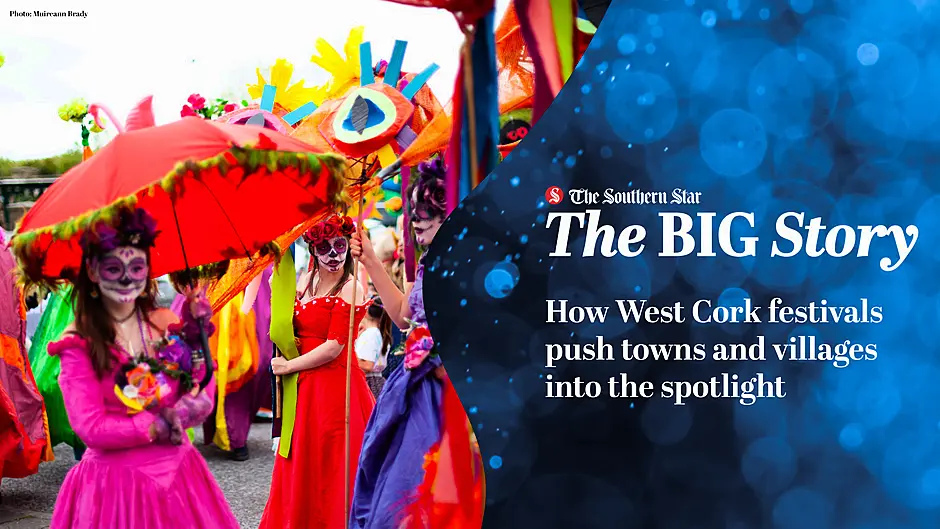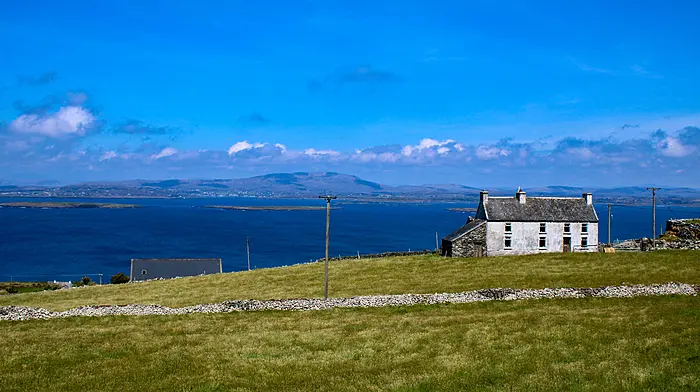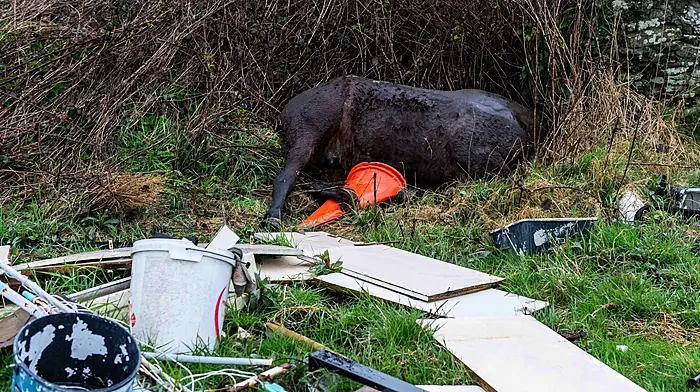The Big Story is a digital, subscriber-only series by The Southern Star. Each part will bring subscribers closer to the stories that matter in West Cork. Browse previous Big Stories here.
***
Festivals in West Cork are valued like white gold for their cultural contribution to the arts, and for the positive boost they bring to the economy and businesses of the towns and villages where they are hosted. MARY McCARTHY speaks to those at the coalface of some of West Cork's finest festivals
Ballydehob
Ballydehob has a long history of hosting festivals. Starting 20 years ago with the Traditional Festival, followed one year later by the Jazz Festival, and many newer ones have come on the scene since then. The old days of going out for a pint and a chat have been replaced by going out that has become more event-based,’ according to Joe O’Leary, Levis Bar, Ballydehob.
‘Ballydehob is a village located in a small rural setting of West Cork,’ he adds.
‘It can be described as an idyllic place. It represents "the real Ireland." We are stronger because the community pulls together, a rising tide floats all boats.’
The cultural merit of festivals is huge. Events bring people together. Artists and musicians create energy, and people are attracted to energy. Businesses are attracted to it, too.
In the village, there is something to look forward to every four to six weeks. People are in good form most of the time. This is important to the mental health and well-being of the community. It means people are occupied and active, contributing and being involved. Around a hundred people from the locality work on the festival committees. This all-year-round effort in the community is king. And so, too, is the contribution from the artistic community.
‘Whoever comes to this rural place, everyone is treated with the same respect. That is normal regardless of celebrity status. In a way, this is "old-school" Ireland, where you can chat in the pub, and brush shoulders with rock stars, farmers, and artists. This represents the microcosm of a community that gathers in our village,’ Joe said.
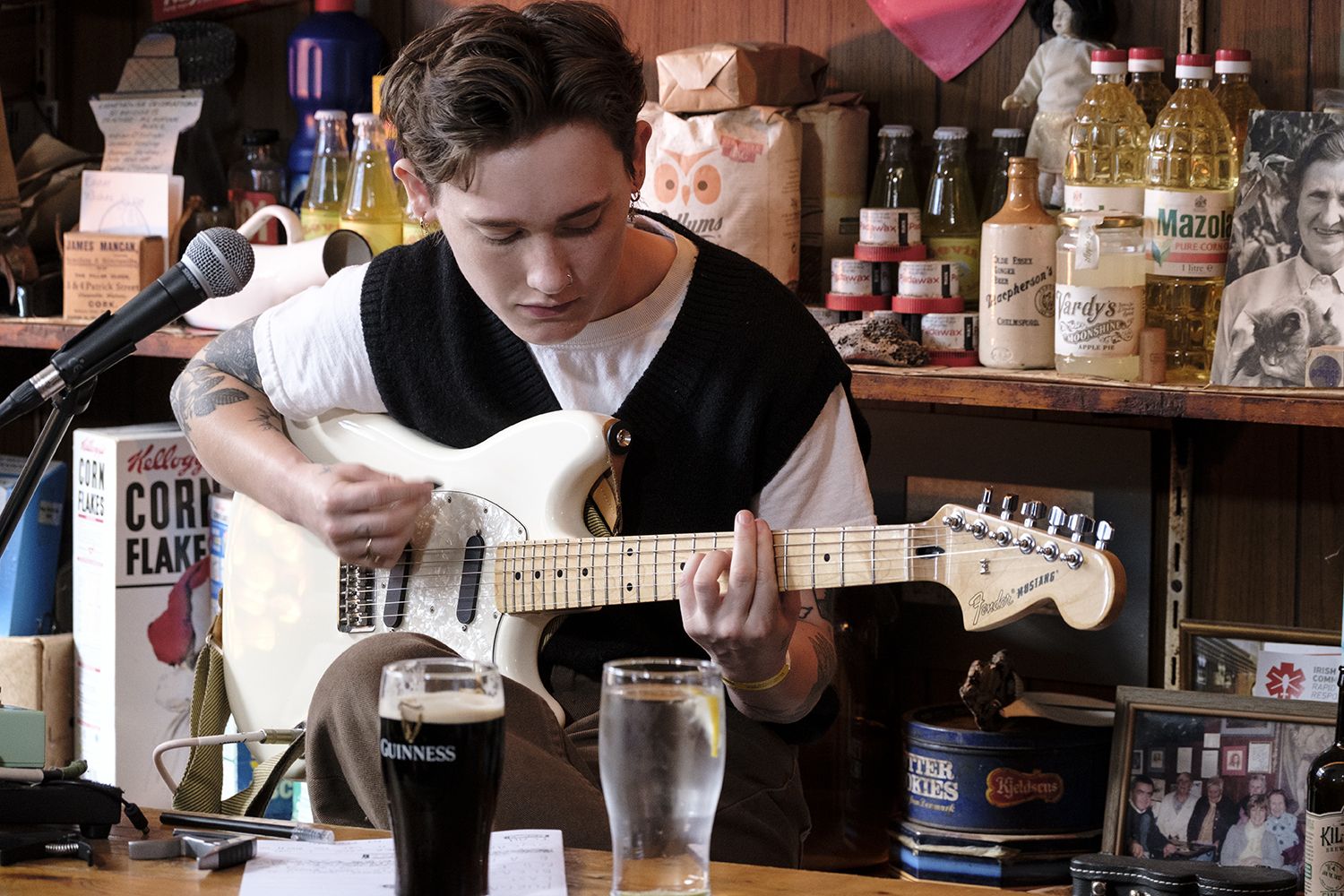 SOAK, a singer-songwriter from Derry in Northern Ireland. SOAK is non-binary. (Photo: R T Breathnach)
SOAK, a singer-songwriter from Derry in Northern Ireland. SOAK is non-binary. (Photo: R T Breathnach)
‘Festivals have a huge effect on the business community,' he added.
‘It is like a blood transfusion ten times a year. It is an injection that helps them survive the winter.'
Ballydehob is a sparsely populated village of 270 people in a parish of 870 people. At the Jazz festival, over two days, 10,000 people come from afar and spend money here, Ninety percent that visit come from outside of West Cork. The concept of putting something on has a good return.
The festivals are promoted in different ways that tell the story of what is on in Ballydehob. Print and digital advertising are used. Word of mouth, social media, and supportive networks help this, too. At a global level, a band in New Orleans will tell other bands when they go home.
‘At all the festivals, everyone gets the buzz of West Cork. Long may it ‘buzz’ on,' Joe added.
Festivals in Ballydehob
1. Heart and Home Bluegrass Weekend – January
2. Brigid’s weekend - February
3. St. Patrick’s Day Festival - March
4. Traditional Music Festival – Late March
5. Jazz and Arts Festival – May Bank Holiday
6. Country Music Festival– June Bank Holiday
7. Fastnet Maritime and Folk Festival – Mid-June
8. Fit-Up Theatre Festival – July and August
9. Summer Festival – Mid- August
10. Cruinniú na mBád – Old Boat Gathering – August
11. Vintage and Old-Time Thrashing Festival – 1st weekend in October.
12. Secret Song – Levis pub – Mid-October
13. Halloween Weekend
14. Levis’ pub hosts around 100 gigs a year
Cape Clear Storytelling Festival - 30th August to 1st September 2024
 Colin Urwin telling tales at Cape Clear International Storytelling Festival in 2023. (Photo: Noel Sweeney)
Colin Urwin telling tales at Cape Clear International Storytelling Festival in 2023. (Photo: Noel Sweeney)
‘Storytelling is part of Irish culture, a tradition from when stories were shared over a fire and passed down through the generations. "Storytelling takes us on a journey of our imagination," something that was mentioned by the storyteller, Clare Murphy, at the festival in 2015.’ according to Rose Woods, co-director of Cape Clear Storytelling Festival.
Each year, the Cape Clear Storytelling Festival takes place around the start of September and is held over three days. This contributes to an end-of-season boost.
Cape Clear is a stunning island off the coast of West Cork. It is a 45-minute journey on the ferry from Baltimore. This is a time to appreciate the fresh sea air. On the trip, seagulls and shags can be seen flying overhead, and the purple heather and yellow gorse can be noticed on the cliff when heading to the island.
In 1994, thanks to an idea from, Chuck and Neil Kruger, who lived on the island, the storytelling festival began.
At the festival, the storytelling tradition of Ireland and internationally is celebrated. This is where new takes are made on old stories, brand-new stories are being told, and new forms of storytelling are showcased.
Acts this year include Tom Muir from Orkney Island, Clare Murphy from Ireland, living in the UK, Hjorleifuir Steffanson from Iceland, Zahra Afsah from Iran, John Spillane, and Paddy O'Brien from Ireland. Many people from the island participate, Seamus Ó Drisceoil leads a storytelling walk, and Micheal John Ó Ceadagáin does a storytelling boat trip on Saturday.
Over the weekend, the Irish language is also highlighted as part of the traditional storytelling form. Events are hosted as Gaeilge. There is a strong partnership with Meitheal Chleire, and the Irish language officer, Ruairí Ó Donnabháin.
‘Over the weekend, it is great to sit in a room of 80 people and not hear a pin drop, and see each face present, alive with full engagement,’ said Rose.
‘What makes this festival unique is that it is hosted on Cape Clear Island,’ she adds.
‘The boat journey allows individuals to disconnect from the mainland. As a result, they are fully present to be there and enjoy the storytelling. Other factors include connection with people and the quality of the incredible programme from world-renowned storytellers. Many who come to be part of the festival, are storytellers themselves. Participating in telling stories at the story slots, or sharing them with friends late into the evenings are two opportunities available to those attending.'
The success of the events comes from the partnership of various businesses and volunteers, who support the festival.
For businesses on Cape Clear, the weekend has a positive effect. Shops, pubs, and restaurants are packed and busy. The whole island is booked out for accommodation.
Promotion of the festival is mostly done through social media, the newspapers, radio interviews, and advertising on posters throughout West Cork.
Rose concluded that the final festival event, The Grand Finale: A Teller’s Farewell, is normally held on Sunday afternoon. And for those looking for a stepping stone back to the mainland, they collaborate with Levis Pub in Ballydehob with a storytelling performance on Monday night.
'We are looking forward to this year’s festival,’ Rose concluded. ‘It is our 30th-anniversary celebrating storytelling together.’
Clonakilty International Guitar Festival - 19th to the 22nd of September
 The Mary Wallopers performing in Con and Maura's in Clonakilty.
The Mary Wallopers performing in Con and Maura's in Clonakilty.
‘West Cork has an endless coastline that has welcomed foreign traders, smugglers, refugees, pirates, tradesmen, artisans, and musicians for centuries. These exchanges and interactions with our beautiful landscape have informed Clonakilty’s inherent culture of inclusivity, community, artistry, and commerce. It is simply the best place in the world and the Clonakilty International Guitar Festival is a celebration of this,’ according to Ray Blackwell, co-organiser of the festival, with Kevin McNally.
This year, Clonakilty International Guitar Festival will celebrate 20 years in existence, taking place from the 19th to the 22nd of September.
'One of the festival's fundamental tenets is: "Look after the artist first and they will look after the audience." This is something that we continue to espouse. Artists are welcomed into our community and become part of our town for the duration of their visit.
‘The events always provide a welcoming and encouraging environment with all the best technical support for performers to realise their ambitions, as well as an audience primed to be enchanted. We envisage a sustainable future for the festival in which the social fabric of the area is nourished by the experience of high-quality music, and artists find a place where they are appreciated and rewarded,’ Ray added.
 Kevin McNally and Ray Blackwell, organisers of the Clonakilty Guitar Festival. (Photo: Clonakilty Guitar Festival)
Kevin McNally and Ray Blackwell, organisers of the Clonakilty Guitar Festival. (Photo: Clonakilty Guitar Festival)
For the audiences, the town of Clonakilty is transformed into a place of wonder and opportunity, where every venue holds the possibility of a magical encounter with a world-class artist, some of whom have a high profile, but many of whom are relatively non-commercial.
'We actively cultivate and appeal to an audience that is curious and adventurous, and that is likely to support their favourite festival discovery after the events are over,' said Ray.
'Residents are drawn into the festival through volunteering and the various outreach elements of our Reverb Programme. Because of this, the festival is embedded in schools, nursing homes, community hubs, adult education centres, and groups that provide services to a diverse range of people that otherwise might not be included.
'The festival is incredibly important to the local economy, its position on the calendar was always by design, as we wanted to extend the tourist season into September. Since pre-COVID times, the festival has always delivered full bed nights in Clonakilty and the surrounding area for its duration.
'Over the time of the entertainment taking place, we eschew the greenfield model for a festival. Instead, our town is our stage, as we reclaim and re-imagine our public spaces and schedule performances and events in all manner of venues from the local schools, and the library to the bars and butcher shops, transforming these places from an ordinary place of daily business, to an evolving stage, where encounters with music and magic are frequent and ubiquitous.
'This is also a much more sustainable model for a festival in which all the businesses in Clonakilty that trade all year round, also get an economic boost, as opposed to outside vendors.
'Since the festival’s inception, we have used the traditional forms of print and broadcast media, as well as social media to promote itself. However, it has always been our intention that word of mouth, is to be our main form of advertisement.
‘The Clonakilty Guitar Festival is run by a small not-for-profit organisation of music lovers,’ concluded Ray.’ We are very proud of the rich, relaxed, educational, exciting, and artistic environment our festival creates in our beautiful seaside town.’
Schull, Fastnet Film Festival – Last weekend of May each year
 Paul Mescal, Lenny Abrahamson, and Daisy Edgar Jones at the Fastnet Film Festival this year. (Photo: Johannes Eisele)
Paul Mescal, Lenny Abrahamson, and Daisy Edgar Jones at the Fastnet Film Festival this year. (Photo: Johannes Eisele)
The Fastnet Film Festival is hosted in the village of Schull every year. It is described as ‘the world’s friendliest film festival,’ according to Hilary McCarthy, communications manager.
At the arts festival, the year before the Fastnet Film festival began, there was one night free. Thanks to David Puttnam, director and film producer, Chris O’Dell, cinematographer, and Maurice Seezer, composer of music for films, three films were screened on that night. The evening proved so popular, that it resulted in a short film festival being introduced to Schull, the following year, seventeen years ago.
This short event has grown year on year. During the shoulder season, the festival takes place in Schull and Cape Clear, over five days in May.
It is a homecoming to Schull for film appreciation. Visitors keep coming back. They look forward to it. Audiences can see films, which they would not normally have access to in the area.
As a result of including a short film competition, despite five hundred films entered, one hundred and fifty films make it through and are screened. Over a few days, each film is screened three times. The festival prides itself in having the pick of 70 guests. All international and national experts in film come for over 5 days for the festival, giving of their time. Their expertise shines at panel discussions, seminars, workshops, and masterclasses.
Chosen by expert guests, 15 feature films are screened in any one of the 10 venues in the village. Directors, producers, and some cast and crew attend the screenings.
Afterward, they take part in a Q&A with the audience.
This year, Pat Collins’ film, That They May Face the Rising Sun, and James Nesbitt's two films about Bloody Sunday were screened.
The programme brings variety for visitors. An opening party is held in an outdoor space, Arran Streett East. The film quiz is on Saturday night, followed by the award ceremony on Sunday. The results of the short film competition are announced, with €25,000 in prize money awarded. The top films are awarded €5,000 each in prize money. Every second year, the Puttnam Prize of €25,000 euros is given to the winner of the script writing competition.
Each evening, an outdoor cinema with a feature film is screened. And live music, drama, children’s workshops, and family entertainment are also included.
The festival adds a difference, by including an Irish language day on Cape Clear Island. One feature film and a short programme of short films in the Irish language are screened on the island.
It is a great festival because we don’t have any red carpet. All come and mingle. Young and up-and-coming filmmakers share the same space in a relaxed atmosphere with film experts. The advantage of this is that feedback from industry experts can be offered because they are sitting in the audience.
From the post-festival reports, the economy benefits. Over the five days, the profile of people, visiting from the film world had spent money, to the tune of three million euros on the Mizen peninsula.
The festival’s impact is also seen positively beyond this. A good profile in the community bought homes in and around the Schull area, as a direct response to visiting the festival. Some include Saoirse Ronan and Paul Mescal.
‘Our village is our screen,’ concluded Hilary. ‘And the Fastnet Film Festival is run for the community and by the community.'
Skibbereen Arts Festival - 25th July to 4th August 2025
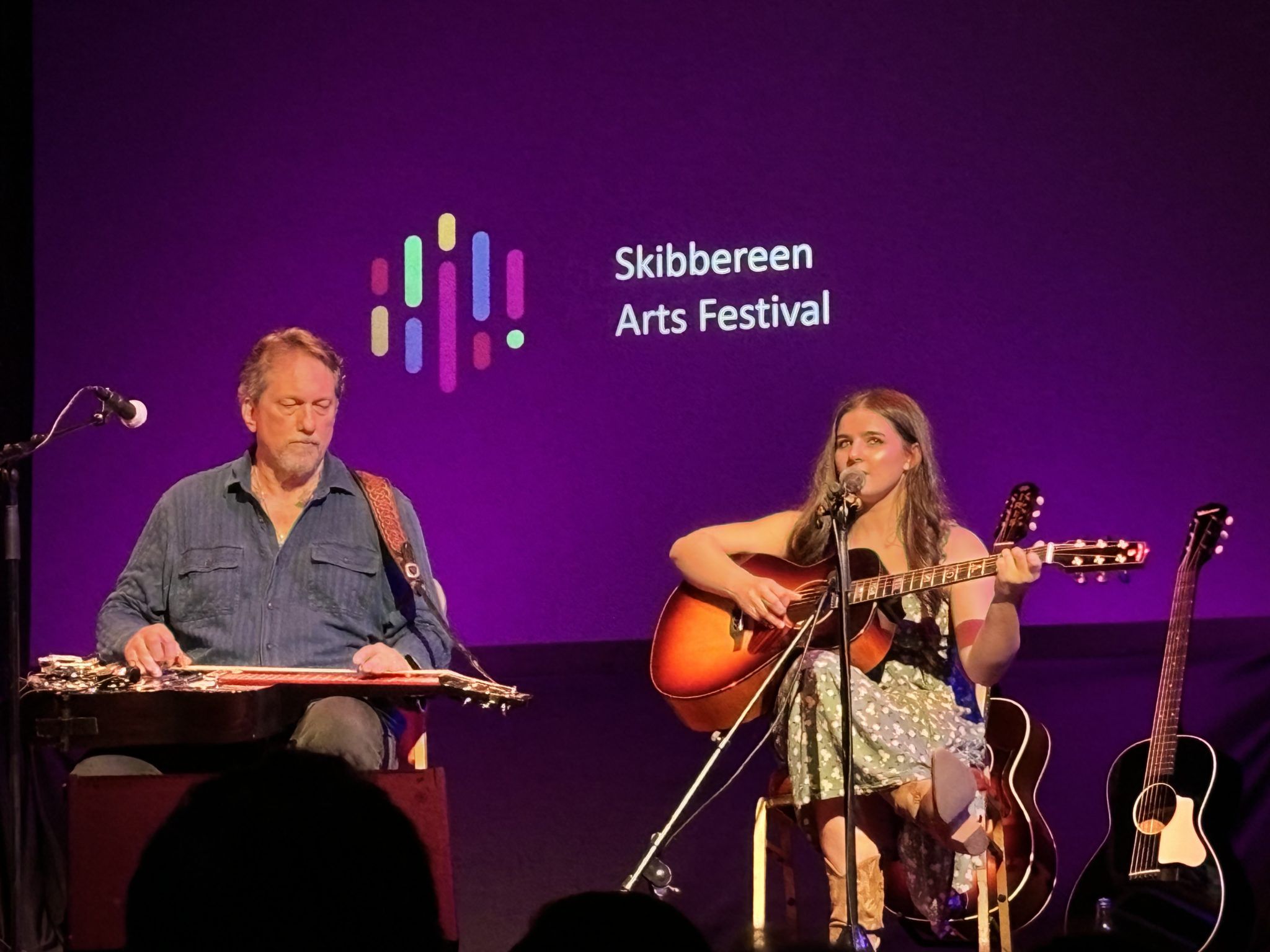 Jerry Douglas & Muireann Bradley at the Skibbereen Town Hall (Photo: Caragh Bell)
Jerry Douglas & Muireann Bradley at the Skibbereen Town Hall (Photo: Caragh Bell)
‘The Skibbereen Arts Festival takes place in Skibbereen, every year on the same week in August, as the Welcome Home Week, once took place years ago. Since 2009, this has been running. It has a long-lasting legacy for the town. In some ways, it inspires and touches people,’ according to Declan McCarthy, director of the festival.
'Skibbereen, located in the heart of West Cork, is an asset. This is a great selling point. The festival is for all. It is not only for the well-off and those who are into the arts. We make it for everyone. By having an open street party, we encourage the community to come out and get involved. Tickets range from affordable and significant ticket prices to the dearest, catering for everybody’s needs.'
The programme features local artists. From painters, and musicians, to writers. At the Town Hall, films are enjoyed. This is for all of us. The usual arts and music. Three plays can be attended on an everyday ticket.
The events are good for all in terms of mental health. There are bands to enjoy, and a range of workshops to learn about from writers.
Apart from people feeling better, well-being is a big theme each year. In association with No 49 North St, a community event like Resonate is hosted.
'We use unusual venues for hosting events,' Declan said. '
The Masonic Lodge for a literary one, the Windmill Rock for a lunchtime session, and Dillons Corner and The Wine Vaults for pop-up exhibitions. Exciting projects have been completed, such as the murals painted on the walls of Skibbereen. They are found at The Fairfield, on the alleyway between The Horse and Hound and Ludgate, and at The Medical Centre.
'This year, The Garden of Shadows, the light and sound installation at Lissard Estate, was very special. The beauty and majesty of it. A world-class event. It was an ambitious thing to have to town given the scope. 1,500 people came to take time out and enjoy it. We were lucky to host it, thanks to public funding and the support of the community.
The festival, also, provides an opportunity for those interested in a career in the arts to think about it. People might find inspiration comes, when they try that pottery-making workshop.
'There is a huge economic benefit to each town or village in West Cork from festivals. Skibbereen Arts Festival plays a vital function in the town. Every euro invested by the government means an eightfold return, because of the opportunity it has for bringing people together. These visitors spend money on food and accommodation.
'To have tourists come back every year, we promote the festival by having a social media presence online with a website. We don’t have a huge budget, so word of mouth is extremely important. Around 6,000 copies of brochures are printed and distributed locally.
'Skibbereen Arts Festival is well known. It is where you see a smile on the face, because of the friendly and relaxed atmosphere. And the quality of having a world-class programme.
‘And thanks to our volunteers, who support the festival. This is what is making it possible,’ concluded Declan. ‘Our festival belongs to the town. Come and get involved.’
Bantry
‘Every year, Bantry hosts three major festivals. West Cork Chamber Music Festival, West Cork Literary Festival, and Masters of Tradition,’ according to a spokesperson from West Cork Music.
Each festival brings people into the area that are not normally here. Those interested are welcome to come and see what is on offer each year. There is a huge programme to choose from, with a massive variety. This year, audiences that attended events, hosting musicians and writers, contributed to two successful festivals.
The festival is promoted in every way possible by the tools available to market it to audiences, from traditional and online media to word of mouth.
West Cork Chamber Music - June 27th to July 6th, 2025
West Cork Chamber Music Festival, provides a great occasion to celebrate chamber music in Bantry. It is an opportunity for local people to see world-class musicians performing in Bantry House and other venues in the town, and being part of the audience.
Since the festival began, this has been the tradition for the last twenty-six years. This year’s programme, consisted of around fifty concerts and eight masterclasses.
Many musicians travel long distances to perform here. Such is the reputation of West Cork that they accept the invite to perform in this town. Events include concerts, masterclasses, and fringe events.
West Cork Literary Festival - July 11th to July 18th 2025
The West Cork Literary Festival takes place annually in Bantry, promoting the best of Irish and international writers in a week-long festival that celebrates literature. This past year saw the festival running for 26 years when it began as part of the Chamber Music Festival.
A wonderful programme of events was offered, and this was complemented by writing workshops made available for those interested in learning the craft of writing. And they were being taught by published writers. Events hosted included three Irish Booker Prize Winners: Paul Lynch, Anne Enright, and Colm Tóibín.
‘It is encouraging to see so many people interested in the arts. All events had a record audience in attendance,’ she added.
Masters of Tradition – 21st to 25th August, 2024
Masters of Tradition is a five-day festival held in Bantry every August. It promotes the full spectrum of traditional music. Each year, an important part of the festival, is in the curating of the events, by having world-class performers. And this contributes to the festival being enjoyed and being a success.
***
West Cork’s landscape is an attraction that resonates with the majesty of the vast Atlantic Ocean. This is the background that informs the vibrancy of the festivals.
All the festivals of the region, depend on a local core group of people’s input throughout the year, which brings a sense of community. This is magnetic for the people who visit. No words describe this, but the essence of that sense of belonging is very much felt.
We are proud of our festival tradition. It celebrates the best in culture and the arts from Ireland and overseas. Creativity allows us to see the good. Events uplift our spirits.
As we leave to go home, we are grateful, savouring those moments that were full of joy.
***
How West Cork festivals push towns and villages into the spotlight is the latest in The Southern Star's digital-only series, The Big Story.
Each part of this series brings readers closer to the stories that matter. The Big Story is only available to Southern Star subscribers.
Written by Mary McCarthy. Videos by Jackie Keogh. Produced and edited by Southern Star digital manager Dylan Mangan.

